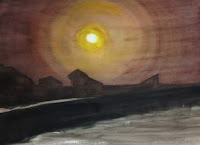Is optimism a function of intelligence?
 It use to bother me when people assumed that my optimism indicated a lack of intelligence. I've had conversations with people who told me that if I knew better, I wouldn't be so happy. If I knew more, I would expect the worst from others and I would be a lot more critical of others' actions.
It use to bother me when people assumed that my optimism indicated a lack of intelligence. I've had conversations with people who told me that if I knew better, I wouldn't be so happy. If I knew more, I would expect the worst from others and I would be a lot more critical of others' actions.I think we close ourselves off to learning, to knowing more, when we make assumptions about others, when we expect the worst. In fact, I think we give little opportunity for ourselves to be wrong. We slam doors before they are opened, for the sake of our "rightness" and cynicism.
Seek and ye shall find. If you are looking for trouble, you will find it. If you want to believe that someone else is wrong, or even evil, you will hear no evidence of the contrary. I've certainly spent time in that frame of heart and mind, more than once in my life.
This type of thinking can motivate us to move in a different direction. It can fire us up to start movements. I don't think that positive change can come from this state of heart and mind. In order to turn this into progress, we need to believe that there is good. We need to be able to recognize it everywhere, even, and especially, when there is no one else that sees or believes. If you generally believe in people's goodness, you can see it, even if no one else in the room sees it. I think our brains are wired to judge, to make assumptions in almost every moment. I don't think we can stop this process, but I think we can recognize how it affects us. If we expect the worst, we shut ourselves down to connecting with others and victimize ourselves in every situation, because we believe that "it is the world we live in." If we can look for the good in others, accept that we don't know them, what they've been through, or maybe what put them in the moment with us, then we may find common ground, learn something, or connect with another. If we do know the other person, we may need to try even harder to stay open minded, because each person has the ability to change and transform and we deserve to have that space to remain open to do so. I like the concept of looking through our eyes like we would through a camera lens* and record only the evidence, none of the assumptions, expectations, dramatic descriptions. I try to notice when my body reacts in a defensive manner so I can count to five and turn my camera on.
I think that our judgments have the power to change the outcome of situations, to elicit different reactions from ourselves and others. When I am able to meet a moment, especially a potential conflict, openly, then I am more likely to bring a caring, peaceful and open heart. If my heart is defeated by the "(negative) state of the world", then I am not able to "be the (positive) change I want to see in the world." It becomes more easy with every moment I open the channels and connections are made. It also becomes more easy to hear criticism when I realize that the other person has their reasons and their path.
My job is to keep my heart, my mind and my hands open.
Grace in, peace out
*Reporting like a camera and pausing are techniques I learned from participating in practice groups organized around the study of "Nonviolent Communication, A Language of Love" by Marshall Rosenberg
Be the change you want to see in the world ~Ghandi